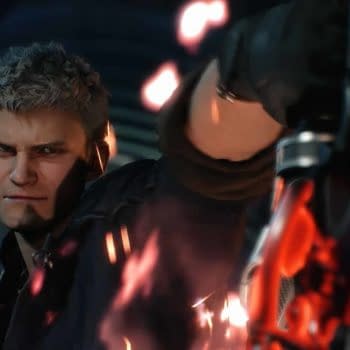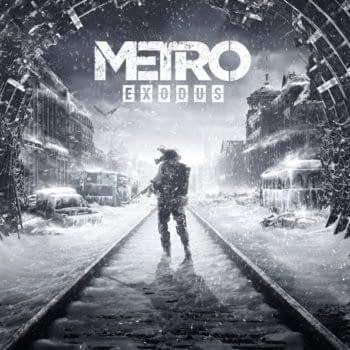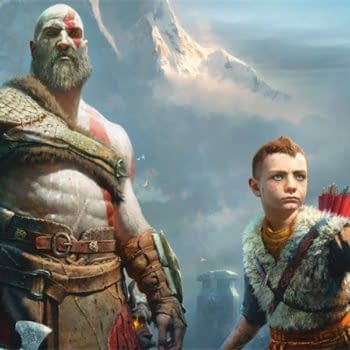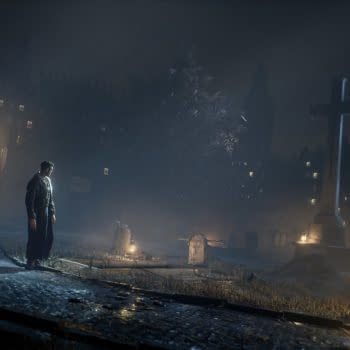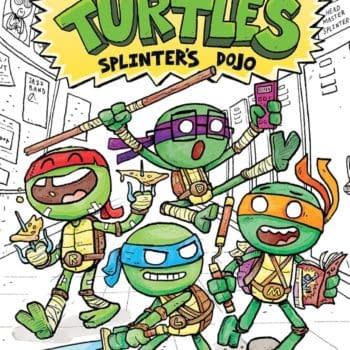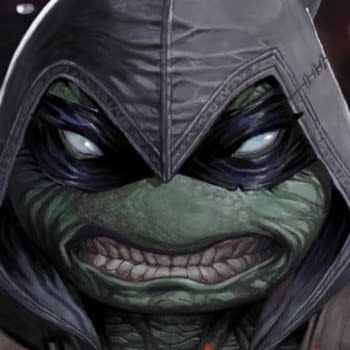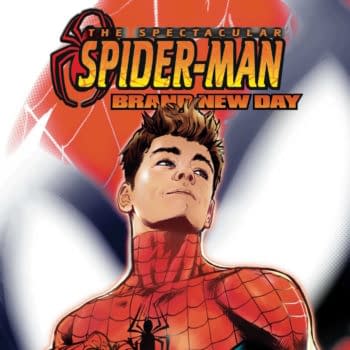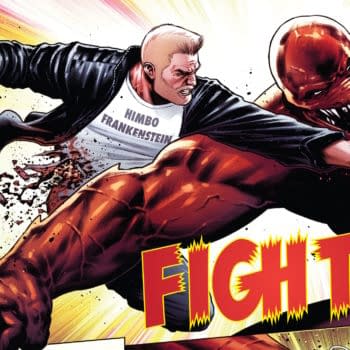Posted in: Comics | Tagged: Comics, entertainment, Thor's Comic Review Column
Thor's Comic Book Review Column: Gutter Magic #1 And Secret Wars #9
THIS WEEK'S REVIEWS:
GUTTER MAGIC #1
SECRET WARS #9
Gutter Magic #1 (IDW, $3.99 )
By Cat Taylor
In this new series, writer, Rich Douek, has created a world that is part Lord of the Rings and part steam punk. Okay, in the first issue it's pretty much just Lord of the Rings, but there are also guns and some clothing that looks more retro-modern. Regardless, this world is set about a century after their World War 2, a war that was fought with magic, and left the wizards as their version of the wealthy "one-percent" and everyone else in a "survival of the fittest" situation, where they scavenge, steal, or barter for any magic trinkets that the wizards have intentionally or unintentionally discarded. However, the star of this story, Cinder Byrnes (ugh), is trying to do more than simply live on magic scraps. He's trying to find something that will give him the ability to cast spells himself, which is something everyone in his family can do, but an ability that he lost.
Of course, an interesting premise that has the potential to go in a variety of directions is the first, most essential element in starting a good story. While the premise here isn't exactly unique, it is one that offers the potential to go multiple directions and it appears that Douek has put a lot of thought into the world of Gutter Magic. However, in order to sustain a series of any kind, great writing and compelling characters are essential. As I've mentioned many times in previous reviews, with the layouts and page count of modern comics, it's often tough to get a lot of story in a first issue. It doesn't hurt most comics from Marvel and DC because they're dealing with mostly well-established characters that already have plenty of built-in interest, but it perplexes me that smaller publishers like IDW follow the same format for new series like this. In fact, this series begs for special and unique treatment more than most since the creators are virtually unknown. As a result, I didn't find this to be a bad story, but it didn't give me enough to fall in love with the characters, and plot-wise I wasn't left wanting more.
While the story itself didn't really grab me, I was pretty impressed with Brett Barkley's art. He's not making innovations in sequential storytelling, but as a fantasy comic book artist, he can stand alongside the best of them. Barkley includes the kind of detail in characters and backgrounds that made Marvel comic book art of the 1980s fun to look at, but rather than big, colorful superheroes, he gives us a muted-toned fantasy world that would have looked great on the cover of a Dungeons & Dragons book.
It seems that with digital and self-publishing now easier to do than ever, there are more comic books available than at any time before. So, I don't envy anyone who is trying to generate interest in a new series. I'm sure it's a tough job. Regardless, the thing to consider is, when fantasy-adventure lovers are looking for their next fix, will they go to Gutter Magic? If so, will they stay with the series for its entire scheduled run? Based on a few other reviews, this is a book that has already impressed several people, but for me, while I didn't think it was bad, it lacked those captivating elements that make a comic stand out. Those elements require creators to do a little something extra rather than simply rely on using a traditional first issue story format and hope the fans will follow.
Cat Taylor has been reading comics since the 1970s. Some of his favorite writers are Alan Moore, Neil Gaiman, Peter Bagge, and Kurt Busiek. Prior to writing about comics, Taylor performed in punk rock bands and on the outlaw professional wrestling circuit. He loved Motorhead and David Bowie as much as you did. You can e-mail him at cizattaylor@hotmail.com.
Secret Wars #9 (Marvel, $4.99)
By Jeb D.
It's obviously impossible to know how the end of the massive Secret Wars/Battleworld epic would have felt had all gone according to plan. With an All-New, All-Different Marvel Universe still in the offing but unseen, there might have been a sense of curiosity… intrigue… the opening of new possibilities… there might have been doubt… cynicism… outrage. Instead, reading the final installment of Jonathan Hickman's Grand Design for the Marvel Universe, there's an overwhelming sense of melancholy: issue #9 of Secret Wars confirms what even spoiler-phobes like myself were dreading: the Fantastic Four, the super-team that initiated and defined Marvel Comics, is being put out to pasture.
At this point, it scarcely matters what prompted this. It actually plays better if this really is some corporate diktat brought on by an Ike Perlmutter hissy fit, requiring mealy-mouthed not-quite denials from those interested in keeping their jobs. Because otherwise, that means that the sundering of the principal cast of The World's Greatest Comics Magazine, and the burial of the Lee-Kirby cornerstone of the Marvel Universe, just seemed like a good idea to someone.
Don't get me wrong: I'm not advocating the Big 2 try and preserve their comic universes in some form of amber—change can be good, and I'm all for shaking up the core Marvel books now and again (though I do think that the near-simultaneous transformations of The Hulk, Thor, and Captain America tend to dilute the individual impacts more than if they'd allowed each character to grow into their new identity for a while before starting the next one).
But, after all, characters that had already been around for decades even before Reed and company made their fateful space voyage are still considered viable intellectual property (and sometimes even vital storytelling ingredients) today: any argument about closed-off or exhausted storytelling possibilities for the FF go double, triple, or fourple for, say, the Dark Knight. I won't argue that much of what shaped the Big 2 superhero universes has been past its sell-by date for a while, but if we can have a dozen or so Avengers and X-Men teams still running their familiar playbooks, there's no good reason the FF couldn't still be right there with them.
It's all particularly poignant in light of what Jonathan Hickman has done with the team during his time with them (as well as spinoffs like the Future Foundation): I won't quibble with those who find his style too slow a burn, but at that, his pacing has been consistent, his ideas intriguing, and his affection for the characters evident on every page. Read with no outside context, Secret Wars actually looks like a book setting up a triumphant return for the team, with Reed as the engineer of the universe's restoration (though Kieron Gillen had most of Ben Grimm's best moments in the ancillaries), and the need to restore family balance after Sue and Valeria's time under Doom's thrall propelling new storylines. Instead, it's "no more super heroing," and a gentle fading away, taking with them such long-time players as Sub-Mariner (decapitated before issue #9 even hit the stands), and Doom (now prettified and metrosexualized as though Toby Kebbel had the right idea).
Given the needle-scratch start of the All-New All-Different All-Bran Marvel Universe, the finale of Secret Wars does serve as a gentle farewell to what has come before. Not that there isn't conflict: the centerpiece is the last (for now, and probably quite a while) Reed Richards-Victor Von Doom showdown, and its familiar clash of ferocious egos, reason against madness. But the resolution has a quiet dignity that mostly works, though, as I indicated earlier, I suspect that the Reed-Sue resolution might have been more difficult than shown here had there been the prospect of following them through an ongoing story. Hickman's Reed has grown warmer and less distracted over the years, and he's definitely sanded off some of the prickliness that earlier writers exploited to great effect, but he still allows the ending to feel a bit pat for all its gentle resolution.
And for all the delays we've seen in this series, if any of it helped Esad Ribic turn out all nine issues without resorting to fill-in artists, it was probably worth it; the conclusion brings the same regal moodiness that has helped make Doom's world feel a realm apart even from the panoply of similar environs we've had from Marvel over the years. There's as much to "read" in Ribic's art as in Hickman's scripts, and unlike many (most?) superhero comic events, this is one I can imagine pulling back down off the shelf (presumably in some prestige edition) for the occasional re-read.
I don't wish to give the impression that I regard the end of Secret Wars as the termination of the "good" version of the Marvel Universe: frankly, current titles like Ms. Marvel, Vision, Scarlet Witch, and Weirdworld are bringing me at least as much pleasure as any Fantastic Four run of the last couple of decades. But the decision to kill off Fantastic Four, and break up its family unit, has an "optic" (as they say in politics these days) that carries more than a whiff of contempt for those fans who've nursed affection for these characters for decades.
Jeb D. 's first newsstand purchase of a Marvel comic was Fantastic Four #25. So he's not quite as old as you thought. But almost.





